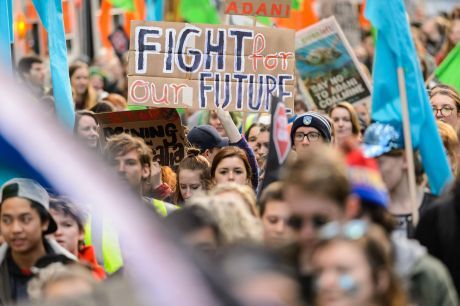What we think
You are here
How Climate Strikes can win

August 28, 2019
The global student climate strikes, along with Extinction Rebellion (XR) mass civil disobedience have had a huge impact.
The clear message from student leaders like Greta Thunberg is that governments and businesses need to pay more than lip service to this existential global crisis. And millions of school students around the world have joined the strikes, demonstrating the huge potential for mobilizing people around the climate crisis issue.
Similarly XR burst onto the scene in London last November, shutting down 5 bridges in the city. They engaged in many actions over the following months throughout the UK, and elsewhere, but XR really made the news by the actions in April where 5 thoroughfares were held in London for 10 days by inclusive mass civil disobedience, with over 1,000 arrests and many thousands participating in support actions.
This was only wound down after the British Parliament passed a climate emergency declaration. More similar actions will be required to hold governments accountable to such declarations.
For example, our Liberal-led Parliament passed a climate emergency resolution, and only days later Trudeau's government announced the approval of the Trans Mountain Pipeline Expansion, a disaster for indigenous people, their lands and for the planet. This hypocrisy is a challenge, given that we need real action, not hot air accompanying disastrous policies.
The Canadian government has a cozy relationship with big oil and the tar sands is central to their economic plans. Given this, how can we get the real climate action that we need?
First of all it's important to state that the both the student strikers and XR have demanded drastic government intervention to curb carbon emissions and protect biodiversity. They have spoken truth to power, and have attracted wide layers of people to their ranks and as supporters.
Secondly, the tactics chosen are disruptive of "business as usual", while attempting to reach out to broader layers of people and communities. This is important because many people are worried about the climate issue, but unless the actions proposed meet the scale of the problem, they will be unlikely to respond.
Direct action and student climate strikes also are suggestive of further tactics for the struggle: workers' strike action.
And for the global climate strike on September 27, the student strikers have called for worker's participation by striking for the climate or participating in some way duringthe day of action.
There should be no illusions that winning unions to strike for the climate is automatic, and there are key debates in the labour movement and amongst workers more generally that have to be engaged in to win workers to strike for the climate.
One of the key planks of the climate action movement is the demand for climate justice for indigenous and other marginalized communities who face the brunt of the crisis, and for workers to be able to move to the many green jobs that we'll need to face this crisis.
First Nations are already at the forefront of blocking pipelines, and supporting Indigenous Sovereignty is important for the movement.
For organized workers to engage in action, they must be convinced that they are accounted for in the climate solutions. And this is a key question, since the working class is the majority of the population, whether organized in a union or not, and the system is built on the exploitation of their collective labour.
Where a student climate strike is a symbolic protest for action by government, a workers' strike can grind capitalist production to a halt, stopping it's productive and destructive forces for the duration. Strike action by unionized workers in conjunction with student climate strikes or XR direct action can only build more confidence in the movement to push for action and amongst workers to take on this destructive system.
The ecological crisis is built into the capitalist system, through boom and slump. It can only be stopped by revolutionary action by the mass of the population, the working class.
Section:









